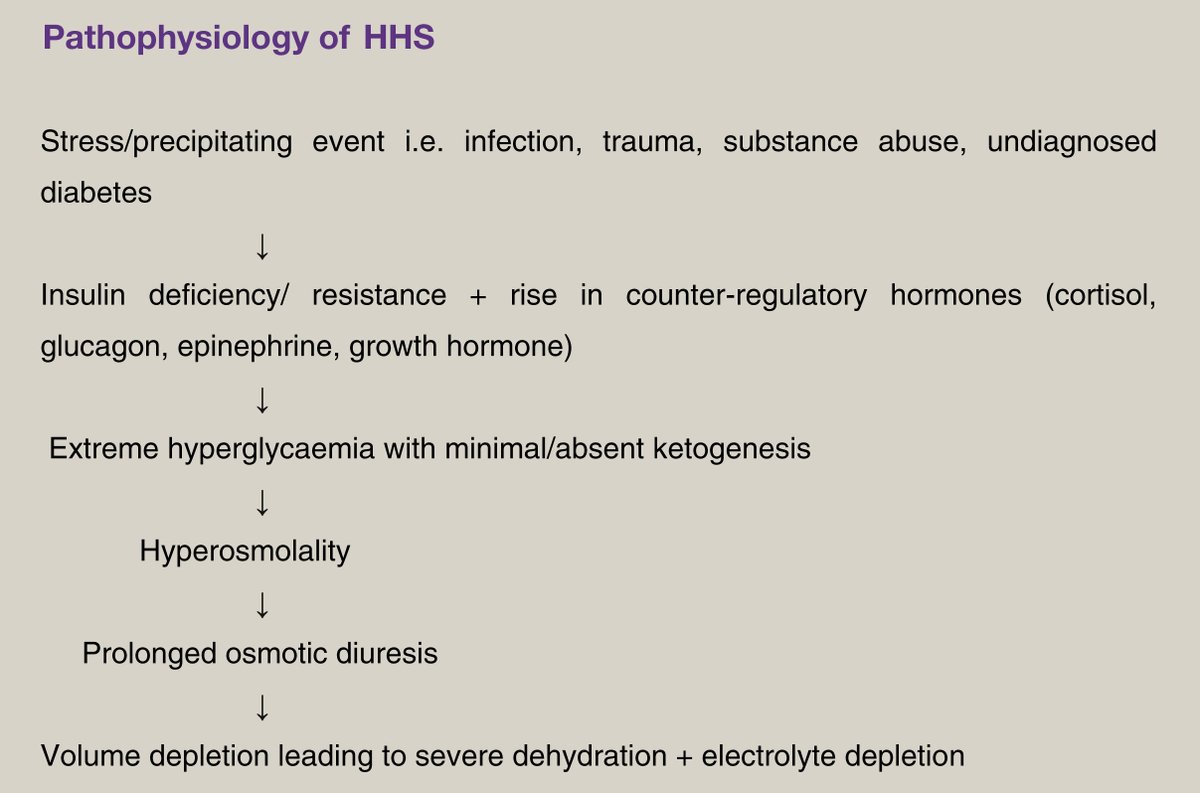DKA isn& #39;t the only hyperglycemic emergency in peds patients.
Check out this peer review https://tinyurl.com/y5ldx5bh ">https://tinyurl.com/y5ldx5bh&... & follow this thread exploring the patho, clinical recognition, & mgmt of #HHS
#EmoryACPNP2020 @brownam130
1/
Check out this peer review https://tinyurl.com/y5ldx5bh ">https://tinyurl.com/y5ldx5bh&... & follow this thread exploring the patho, clinical recognition, & mgmt of #HHS
#EmoryACPNP2020 @brownam130
1/
#HHS or Hyperglycemic Hyperosmolar State usually affects adults with #T2DM
-Growing incidence in peds population d/t increased rates of childhood obesity
-Mixed features of #HHS and #DKA can also occur in #T1DM
2/
-Growing incidence in peds population d/t increased rates of childhood obesity
-Mixed features of #HHS and #DKA can also occur in #T1DM
2/
#HHS is characterized by  https://abs.twimg.com/emoji/v2/... draggable="false" alt="⬆️" title="Pfeil nach oben" aria-label="Emoji: Pfeil nach oben"> serum glucose,
https://abs.twimg.com/emoji/v2/... draggable="false" alt="⬆️" title="Pfeil nach oben" aria-label="Emoji: Pfeil nach oben"> serum glucose,  https://abs.twimg.com/emoji/v2/... draggable="false" alt="⬆️" title="Pfeil nach oben" aria-label="Emoji: Pfeil nach oben"> serum osmolality, &
https://abs.twimg.com/emoji/v2/... draggable="false" alt="⬆️" title="Pfeil nach oben" aria-label="Emoji: Pfeil nach oben"> serum osmolality, &  https://abs.twimg.com/emoji/v2/... draggable="false" alt="⬆️" title="Pfeil nach oben" aria-label="Emoji: Pfeil nach oben">
https://abs.twimg.com/emoji/v2/... draggable="false" alt="⬆️" title="Pfeil nach oben" aria-label="Emoji: Pfeil nach oben"> https://abs.twimg.com/emoji/v2/... draggable="false" alt="⬆️" title="Pfeil nach oben" aria-label="Emoji: Pfeil nach oben">
https://abs.twimg.com/emoji/v2/... draggable="false" alt="⬆️" title="Pfeil nach oben" aria-label="Emoji: Pfeil nach oben"> https://abs.twimg.com/emoji/v2/... draggable="false" alt="⬆️" title="Pfeil nach oben" aria-label="Emoji: Pfeil nach oben"> hypertonic dehydration WITHOUT ketosis
https://abs.twimg.com/emoji/v2/... draggable="false" alt="⬆️" title="Pfeil nach oben" aria-label="Emoji: Pfeil nach oben"> hypertonic dehydration WITHOUT ketosis
Check out this quick overview of the patho of HHS
3/
Check out this quick overview of the patho of HHS
3/
Guideline criteria from @ispad_org for HHS:
-BG>600, arterial pH >7.30, bicarb >15
-Serum osmolality >320
- 0-minimal ketonuria & ketonemia
-And altered mental status
4/
-BG>600, arterial pH >7.30, bicarb >15
-Serum osmolality >320
- 0-minimal ketonuria & ketonemia
-And altered mental status
4/
Clinical Presentation similar to #DKA
-polyuria, polydipsia, abd pain, N/V, dehydration, & AMS
So why is #HHS so serious?
Dehydration progresses over days-week w/ few clinical signs. Hypertonicity preserves intravascular space despite extreme fluid & electrolyte losses
5/
-polyuria, polydipsia, abd pain, N/V, dehydration, & AMS
So why is #HHS so serious?
Dehydration progresses over days-week w/ few clinical signs. Hypertonicity preserves intravascular space despite extreme fluid & electrolyte losses
5/
Fluid losses in #HHS are DOUBLE  https://abs.twimg.com/emoji/v2/... draggable="false" alt="😲" title="Erstauntes Gesicht" aria-label="Emoji: Erstauntes Gesicht"> that in #DKA. Cornerstones of mgmt include:
https://abs.twimg.com/emoji/v2/... draggable="false" alt="😲" title="Erstauntes Gesicht" aria-label="Emoji: Erstauntes Gesicht"> that in #DKA. Cornerstones of mgmt include:
-Aggressive fluid resuscitation
-Electrolyte correction
-Maintaining renal perfusion
-Conservative insulin administration
Lets talk specifics!
6/
-Aggressive fluid resuscitation
-Electrolyte correction
-Maintaining renal perfusion
-Conservative insulin administration
Lets talk specifics!
6/
Fluid Resuscitation:
-20ml/kg of NS repeated to restore perfusion followed by
-0.45-0.75% NS over the next 24-48hrs for 12-15% of body weight
-slow Na correction at 0.5mmol/L/hr
-& replacement fluids of urinary losses
7/
-20ml/kg of NS repeated to restore perfusion followed by
-0.45-0.75% NS over the next 24-48hrs for 12-15% of body weight
-slow Na correction at 0.5mmol/L/hr
-& replacement fluids of urinary losses
7/
Early insulin therapy NOT recommended. Fluids alone=marked decrease in BG
-Initiate insulin @ 0.025-0.05 U/kg/hr once glucose is no longer declining @ > 50mg/hr with fluids alone
-Monitor glucose hourly
8/
-Initiate insulin @ 0.025-0.05 U/kg/hr once glucose is no longer declining @ > 50mg/hr with fluids alone
-Monitor glucose hourly
8/
Profound K, Mg, & phos depletion in #HHS
-Add K to IVF prior to insulin initiation when serum K < 5.5
-may consider mag and phosphate repletion as well
-Bicarb is contraindicated https://abs.twimg.com/emoji/v2/... draggable="false" alt="🙅♀️" title="Frau gestikuliert „Nicht OK“" aria-label="Emoji: Frau gestikuliert „Nicht OK“"> d/t risk for hypokalemia
https://abs.twimg.com/emoji/v2/... draggable="false" alt="🙅♀️" title="Frau gestikuliert „Nicht OK“" aria-label="Emoji: Frau gestikuliert „Nicht OK“"> d/t risk for hypokalemia
-Check serum electrolytes Q2-3h
9/
-Add K to IVF prior to insulin initiation when serum K < 5.5
-may consider mag and phosphate repletion as well
-Bicarb is contraindicated
-Check serum electrolytes Q2-3h
9/

 Read on Twitter
Read on Twitter serum glucose, https://abs.twimg.com/emoji/v2/... draggable="false" alt="⬆️" title="Pfeil nach oben" aria-label="Emoji: Pfeil nach oben"> serum osmolality, & https://abs.twimg.com/emoji/v2/... draggable="false" alt="⬆️" title="Pfeil nach oben" aria-label="Emoji: Pfeil nach oben">https://abs.twimg.com/emoji/v2/... draggable="false" alt="⬆️" title="Pfeil nach oben" aria-label="Emoji: Pfeil nach oben">https://abs.twimg.com/emoji/v2/... draggable="false" alt="⬆️" title="Pfeil nach oben" aria-label="Emoji: Pfeil nach oben"> hypertonic dehydration WITHOUT ketosisCheck out this quick overview of the patho of HHS 3/" title=" #HHS is characterized by https://abs.twimg.com/emoji/v2/... draggable="false" alt="⬆️" title="Pfeil nach oben" aria-label="Emoji: Pfeil nach oben"> serum glucose, https://abs.twimg.com/emoji/v2/... draggable="false" alt="⬆️" title="Pfeil nach oben" aria-label="Emoji: Pfeil nach oben"> serum osmolality, & https://abs.twimg.com/emoji/v2/... draggable="false" alt="⬆️" title="Pfeil nach oben" aria-label="Emoji: Pfeil nach oben">https://abs.twimg.com/emoji/v2/... draggable="false" alt="⬆️" title="Pfeil nach oben" aria-label="Emoji: Pfeil nach oben">https://abs.twimg.com/emoji/v2/... draggable="false" alt="⬆️" title="Pfeil nach oben" aria-label="Emoji: Pfeil nach oben"> hypertonic dehydration WITHOUT ketosisCheck out this quick overview of the patho of HHS 3/" class="img-responsive" style="max-width:100%;"/>
serum glucose, https://abs.twimg.com/emoji/v2/... draggable="false" alt="⬆️" title="Pfeil nach oben" aria-label="Emoji: Pfeil nach oben"> serum osmolality, & https://abs.twimg.com/emoji/v2/... draggable="false" alt="⬆️" title="Pfeil nach oben" aria-label="Emoji: Pfeil nach oben">https://abs.twimg.com/emoji/v2/... draggable="false" alt="⬆️" title="Pfeil nach oben" aria-label="Emoji: Pfeil nach oben">https://abs.twimg.com/emoji/v2/... draggable="false" alt="⬆️" title="Pfeil nach oben" aria-label="Emoji: Pfeil nach oben"> hypertonic dehydration WITHOUT ketosisCheck out this quick overview of the patho of HHS 3/" title=" #HHS is characterized by https://abs.twimg.com/emoji/v2/... draggable="false" alt="⬆️" title="Pfeil nach oben" aria-label="Emoji: Pfeil nach oben"> serum glucose, https://abs.twimg.com/emoji/v2/... draggable="false" alt="⬆️" title="Pfeil nach oben" aria-label="Emoji: Pfeil nach oben"> serum osmolality, & https://abs.twimg.com/emoji/v2/... draggable="false" alt="⬆️" title="Pfeil nach oben" aria-label="Emoji: Pfeil nach oben">https://abs.twimg.com/emoji/v2/... draggable="false" alt="⬆️" title="Pfeil nach oben" aria-label="Emoji: Pfeil nach oben">https://abs.twimg.com/emoji/v2/... draggable="false" alt="⬆️" title="Pfeil nach oben" aria-label="Emoji: Pfeil nach oben"> hypertonic dehydration WITHOUT ketosisCheck out this quick overview of the patho of HHS 3/" class="img-responsive" style="max-width:100%;"/>


